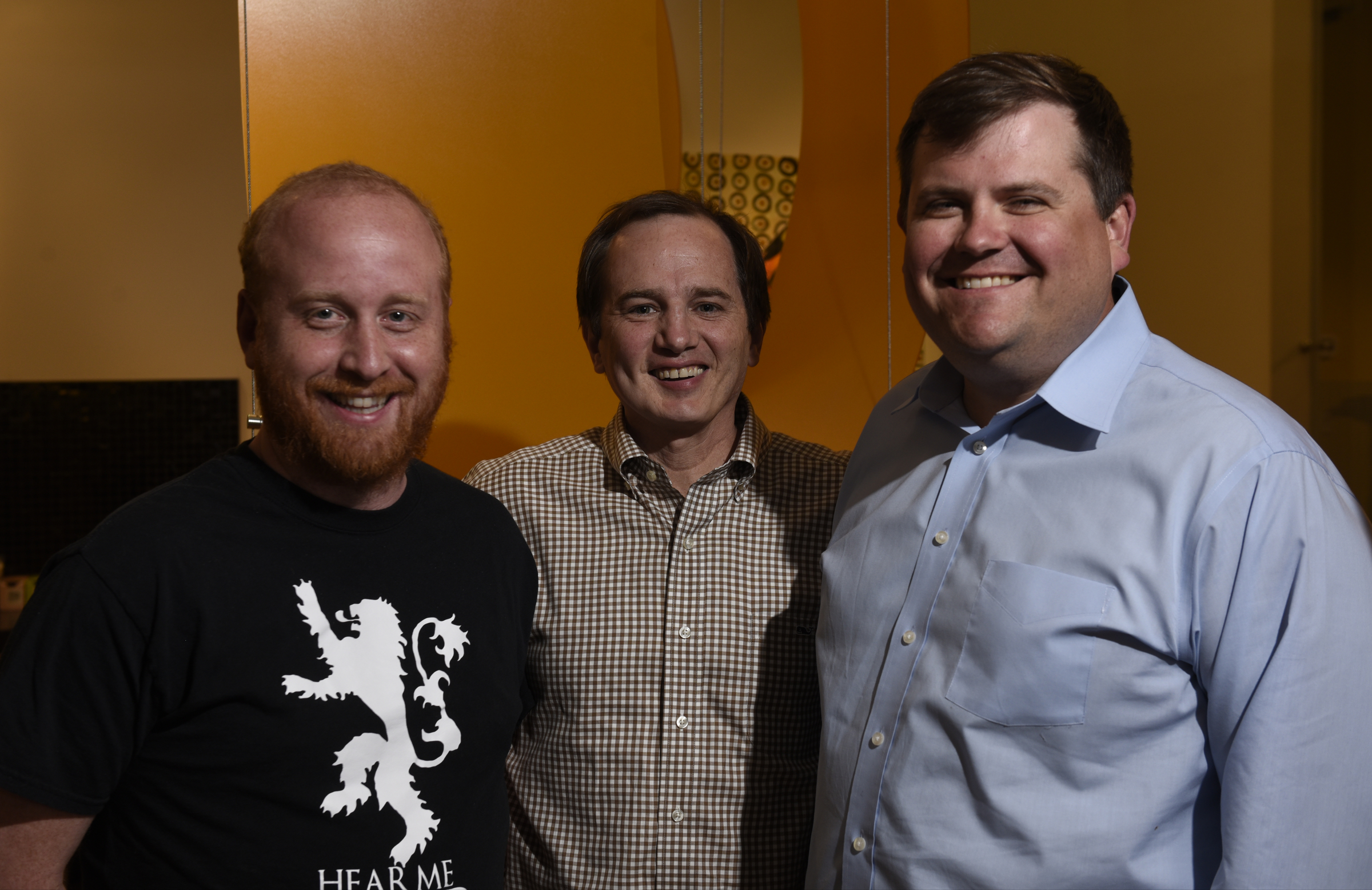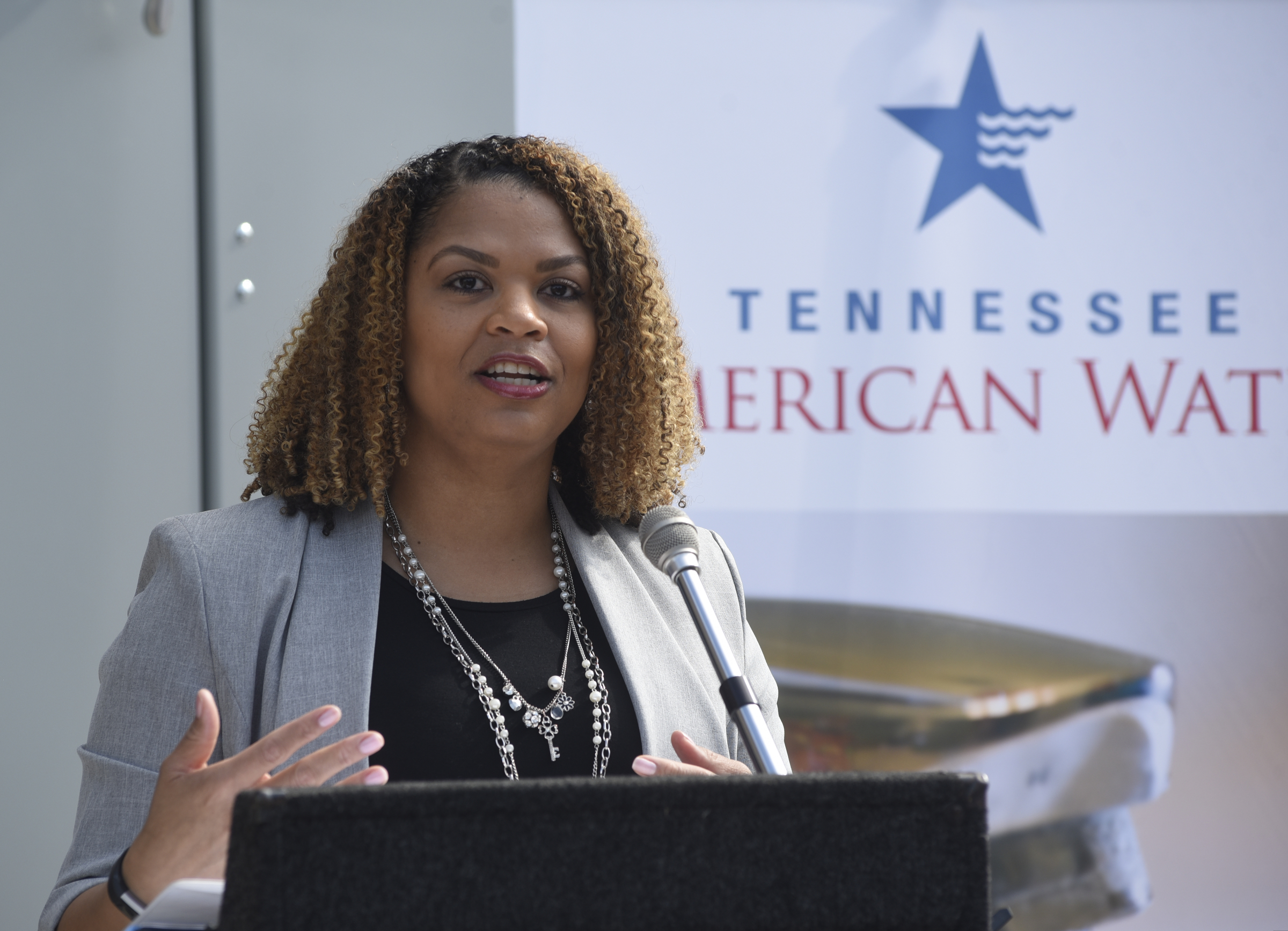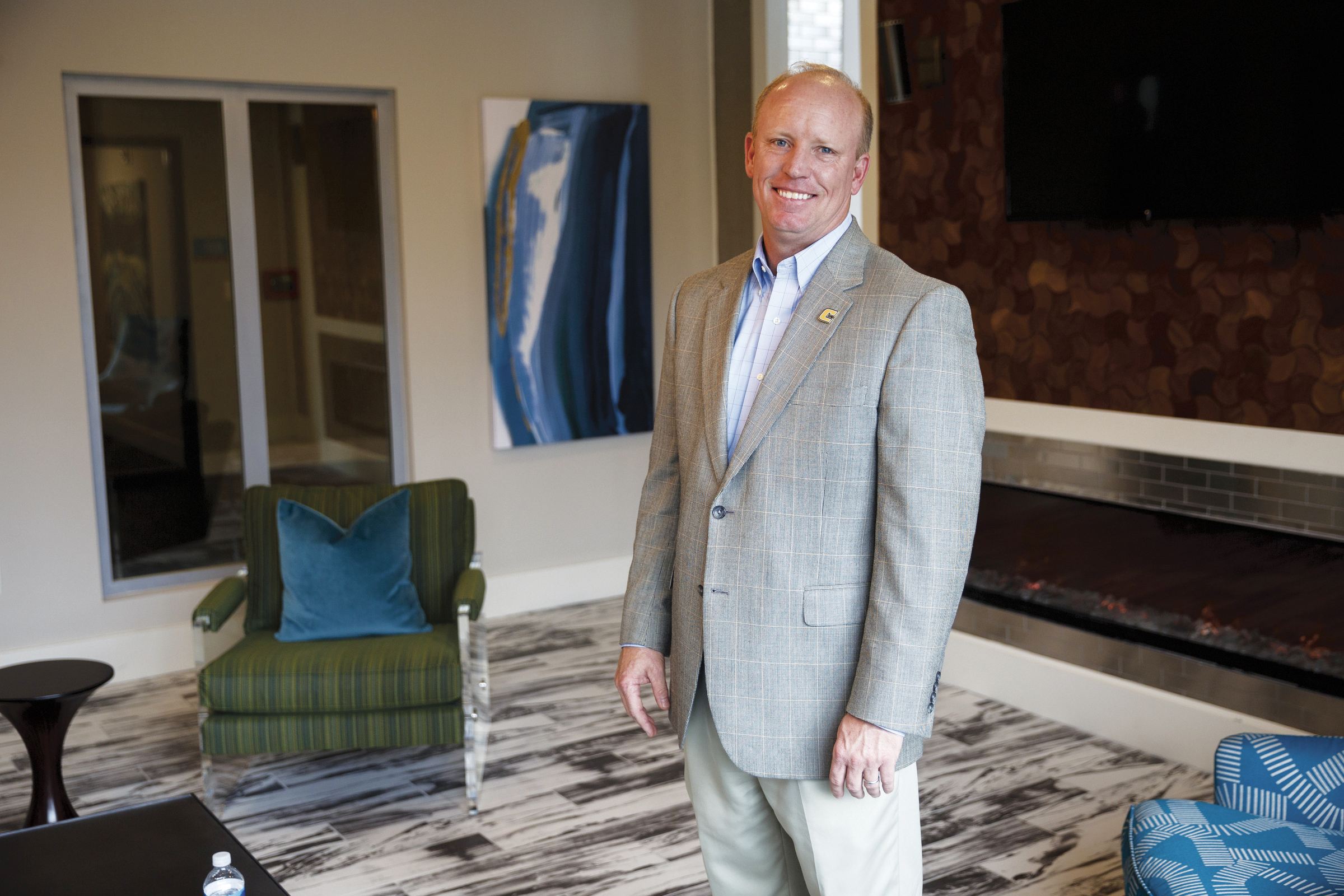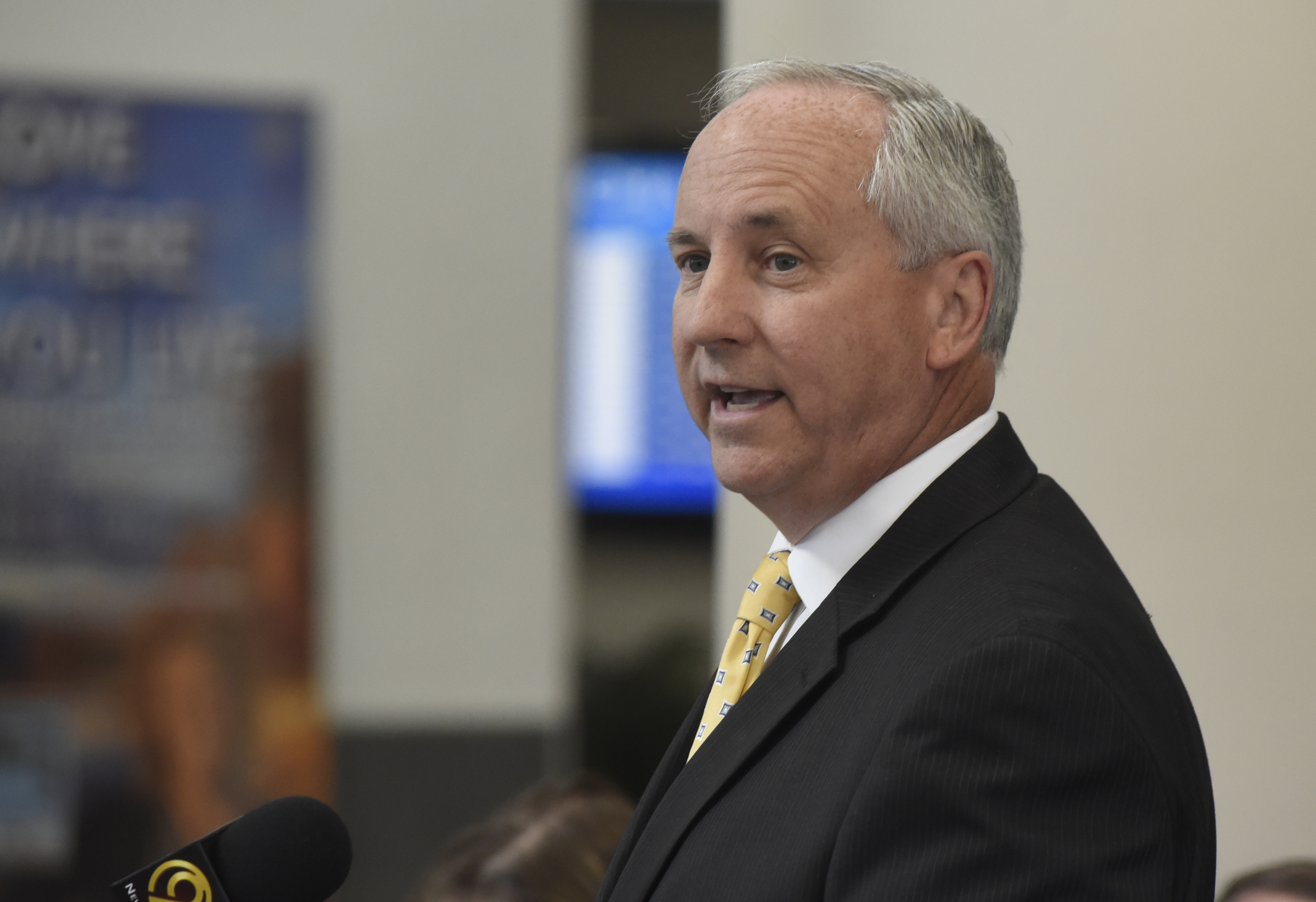What business leaders were the most influential in shaping the local economy in 2016?
In the Chattanooga region, 2016 was a year of building for the future. The first new nuclear reactor of the 21st century and the biggest plant construction project ever in the region was completed, while a record amount of new housing, hotel and retail development was launched in downtown Chattanooga to soon double the number of residents in the central city. One of the biggest floorcovering plants took shape in North Georgia as two carpet companies combined and Chattanooga's airport added another airline and parking facility. Tennessee's biggest heath insurer prepared to implement its biggest rate hike under the so-called Obamacare program, while the business trio that built one of Chattanooga's most successful startups in the past decade began a fund and program to bring more logistics companies to Chattanooga.
The individuals who led such efforts and did the most to reshape the regional economy are our Most Valuable Players in business in 2016. Our top list of MVPs includes both seasoned veterans and newly named heads of local businesses and reflects the diversity of Chattanooga's changing economy.
Tennessee American Water President Valoria Armstrong pushes new boundaries
During one of the worst droughts in Chattanooga in decades, Valoria Armstrong helped keep the water flowing this year for more than 300,000 persons served by the Tennessee American Water Co.
Armstrong, who took over as head of Tennessee's biggest privately owned water utility a year ago, is used to taking on big challenges.
At age 26, she was elected in 2005 as the youngest and first female president in more than 50 years of the Chattanooga-Hamilton County Branch of the National Association for the Advancement of Colored People (NAACP). At the time, she was a manager at Food Lion where she applied three times for a top role in human resources at the company.
After being overlooked the third time, she determined to leave the grocer and she joined Tennessee American Water in 2011. After a brief stint as a human resources manager for the utility's parent company, American Water Co., in St. Louis, she was chosen in late 2015 to become president of Tennessee American Water. She is the first African-American woman to hold the top job at Tennessee American and is one of the highest ranking black business leaders in Chattanooga.
She hopes she is not the last. Armstrong says businesses need to do more to recognize the diverse talent within their ranks.
"We have to recognize the talent that is all around us," Armstrong says. "And that talent is not going to always look like you."
Larry Buie, general manager of Chattanooga Gas Co., who is scheduled next year to be one of the first African-American chairs of the Chattanooga Area Chamber of Commerce, praises Armstrong for breaking through both racial and gender glass ceilings at the water utility.
"It's been said that diversity without inclusion is like being invited to a party but never being asked to dance," Buie says. "(Valoria Armstrong) not only has she been invited to the party, she's leading the dance."
At the water utility, Tennessee American continues to invest in equipment to better treat and distribute the water it gets from the Tennessee River. During this year's drought, the utility also used water buffalo trucks and other equipment to help aid other utilities relying upon depleted groundwater supplies.
To help maintain and upgrade Chattanooga's water supply, Tennessee American plans to spend almost $16 million on equipment upgrades in 2017, including a $2 million river crossing to reinforce water service north of the Tennessee River.
"With changes in technology in the water utility industry, we are investing in our system so that customers benefit from these improvements," Armstrong says.
The Tennessee American Water president also serves as chairwoman of the Chattanooga chapter of the American Cancer Society, and has been actively involved in the Chattanooga chapter of the Society of Human Resources Management, the University of Tennessee at Chattanooga Chancellors' Diversity Advisory Council, and the Volkswagen Diversity Council. She also serves on the board of the Orange Grove Center in Hamilton County.
Dynamo Accelerator's founders get back to their trucking industry roots
 Photographed at the offices of the Lamp Post Group on Monday, Apr. 4, 2016, in Chattanooga, Tenn., Allan Davis, Barry Large and Ted Alling, from left, are the founders of Access America Transport, a company they sold in 2014. They have recently launched Dynamo, a company that is a logistics accelerator.
Photographed at the offices of the Lamp Post Group on Monday, Apr. 4, 2016, in Chattanooga, Tenn., Allan Davis, Barry Large and Ted Alling, from left, are the founders of Access America Transport, a company they sold in 2014. They have recently launched Dynamo, a company that is a logistics accelerator. In 2016, Chattanooga became home to the Dynamo Accelerator, a program that aims to help launch tech startup companies in the logistics, transportation and supply chain business, along with Dynamo's sibling, an $18 million venture capital fund. The $18 million number was 50 percent more than the fund's original target and one of the biggest capital raises ever for a VC fund in Chattanooga.
Three Chattanoogans are the driving force behind both ventures: Ted Alling, Barry Large and Allan Davis.
The trio met at a fraternity at Samford University in Alabama and, after graduating from college, they started Access America Transport and built the company into a nearly $600 million-a-year logistics business before selling the company in 2014 to Coyote Logistics, which was acquired for $1.8 billion a year later by United Parcel Service. Even before selling their business, the entrepreneurs founded the Lamp Post Group, a business incubator headquartered in the second floor of the historic Loveman's department store building in downtown Chattanooga. It offers business startups working space, back-office support and early-stage funding in exchange for a percent of ownership.
Lamp Post is based on the model that launched Access America and made millionaires of the Alling, Large and Davis in their mid-30s when they sold their Chattanooga-based trucking logistics startup.
Access America for years was housed in a back room of Key-James Brick, a business owned by Large's father, James H. Large. Complimentary office space, consistent mentorship and access to cash helped launch the third-party logistics company that doubled its sales nearly every year for 12 years.
Initially, Lamp Post Group helped guide a number of what might be called "sexy" startups, such as Chattanooga Whiskey distillery and advertising firm Fancy Rhino. Recently, Lamp Post backed the nonprofit group WayPaver Labs, which describes itself as "a serious effort to establish a settlement on the moon within the next two decades."
But Lamp Post Group came back down to earth with Dynamo.
The Dynamo Accelerator chose 10 teams in the logistics, transportation and supply chain business from a pool of 120 applicants to take part in the three-month program. More than half of the teams in the program are already profitable. Some are already established and trying to overcome scale and funding issues.
"They want to invest in more unsexy businesses, the venture capitalists do," Alling said in early October after Dynamo Demo Day, when representatives from the startup companies took turns onstage at the Tivoli Theatre to make sales pitches to potential investors.
River City President Kim White helps bring record investment to Chattanooga's central city
When Kim White and her husband Joe Dan moved downtown more than a decade ago, the housing, restaurant and entertainment options near their home were far more limited than they are today.
"There wasn't much going on after 5 o'clock downtown in those days, but downtown is a much different place today," says White, who has headed the downtown development agency, the River City Co., for the past seven years. "We're seeing a total transformation of the central city."
White, a former Alltel Communications manager who went on to eventually head both the Corker Group and Luken Holdings before being named president of the River City Co. in 2009, has long been a downtown cheerleader. A native of Chattanooga, White is a graduate of the University of Tennessee at Chattanooga, which she believes to be a key resource for the continued growth of downtown.
The nonprofit, privately-funded River City Co. celebrates its 30th birthday this year after coordinating the work of developers, foundation leaders and city of Chattanooga officials to help create millions of dollars in parks, riverwalks, streetscapes and other attractions to create a scenic downtown. Those early investments are now paying big dividends, White says.
Nearly $1 billion of apartments, hotels, student dorms, offices and stores are being added to Chattanooga's central city in one of the biggest building booms in the city's history. River City estimates over the next couple of years the number of people living downtown will double with the addition of 2,599 apartment units, 268 condos and townhomes and 1,461 beds for college students. With the drawing power of the Tennessee Aquarium, Chattanooga Choo Choo and other tourist attractions, hotel developers also are adding 748 rooms for overnight guests.
White insists there is a growing demand for such housing. Among the 55,000 people who work within a 1.5-mile radius of downtown Chattanooga, only 3.2 percent now live in the city center, on the North Shore or the Southside. Even at the University of Tennessee at Chattanooga, the urban campus houses fewer than one in three students.
But White said surveys indicate 62 percent of millennials want to live in an urban environment and a growing number of empty-nesters want to shorten their commute to work. Other cities that have built attractive downtowns such as Charleston, S.C., and Asheville, N.C., have nearly three times the share of city-center workers who choose to live downtown.
"If we match those cities, we can sustain even more downtown housing, and that in turn should help bring even more places to eat, shop or entertain all those people living or coming downtown," White says. "It's an exciting time downtown right now."
Developer Chris Curtis revitalizing MLK with Douglas Heights, other projects
Martin Luther King Boulevard is growing with new development near the University of Tennessee at Chattanooga campus - and looming over it all is Douglas Heights, a $41 million, 691-bed apartment complex that opened in August and caters to college students.
The man behind Douglas Heights is Chattanooga developer Chris Curtis, a Baylor School graduate who studied finance at the University of Alabama before deciding to enter the construction and development business almost two decades ago. Curtis, who's in his mid-40s, previously built or developed mostly storage units, truck stops and other projects, mainly in Texas.
Curtis is president of Chattanooga-based Riverside Development LLC, and one of his company's employees who oversees real estate introduced him to the M.L. King Boulevard and Douglas Street site.
"We studied it about a year [then] we decided to pull the trigger," Curtis says.
Construction of the 354,000-square-foot complex took about two years. Douglas Heights was built without any public financial incentives, but Curtis expects the district will need community assistance to continue to grow.
"We want to see this entire district be successful," he says.
Curtis says he is looking at potentially building two other phases of similar housing nearby.
But first, he plans to develop nearby buildings on M.L. King. One project on the UTC side of M.L. King would house mixed-use space, including 28 apartments, Curtis says.
An "indoor beer garden" is opening inside another property Curtis owns at 336 E. Martin Luther King Blvd., which Jay Boyd, an entrepreneur in his mid-20s, is converting into OddStory Brewing Co.
The stretch of MLK from Georgia Avenue to the train trestle is being revitalized with help from the River City Co. and Chattanooga foundations, which have provided grants to a number of businesses for such things as signage.
Other new developments there include Hutton & Smith Brewing Co. a microbrewery and tap room that opened last year at 431 E. M.L. King Blvd. The Camp House coffee shop moved into a storefront under the Volunteer Building's garage. Also being renovated is an old, brick building at the corner of Houston Street and MLK next to JJ's Bohemia, a small club with live music.
UTC has been recognized for linking "town with gown" along Vine Street, including by breaking ground last year on a 600-bed residence hall and building its new library on Vine.
Curtis sees downtown advancing down MLK as well.
"We're going to bring downtown into this district," he said.
Terry Hart charts a growth course for Chattanooga Metropolitan Airport
Chattanooga Metropolitan Airport CEO Terry Hart says the easy part was landing new United Airlines service to the New York City area. The hard part, he says, will be to sustain it.
"United needs to be profitable for us to keep and grow the service," Hart said earlier this year just before the airline began nonstops between Chattanooga and Newark Liberty International Airport in September.
The airport, already on pace for a record-breaking year in passenger boardings, is expected to gain a big lift from the new United service.
The nonstops, along with new flights between Chattanooga and Chicago on the carrier, may help the airport top 400,000 passenger boardings for the first time ever this year if figures stay on course, according to Hart. The airline added about 200 seats a day to the Chattanooga market with the new flights, he says.
Meanwhile, Hart is shepherding a potential multimillion-dollar expansion at Lovell Field by West Star Aviation, which opened a new corporate aircraft maintenance facility at the airport.
The company plans to build a 45,000-square-foot paint facility on a 13-acre parcel that includes the former Air National Guard site on the passenger terminal side of the main runway. Also on the site, the aircraft maintenance and equipment firm plans to build a 55,000-square-foot maintenance facility.
West Star plans to invest $22.5 million in its air maintenance facility after buying a 40,000-square-foot hangar on the west side of the airport last year.
"West Star has arrived and is positioned for growth," Hart says.
Hart came to the Chattanooga Airport in 2008 as vice president of operations, and he became CEO in 2012.
Stacy Lightfoot helps students 'Step Up' and learn through internships
Last summer, 76 low-income Hamilton County high school seniors and juniors got internships at local businesses through Step-Up Chattanooga, a new program of the Public Education Foundation that aims to give students the skills they need to make it in today's job market.
And look for that to grow by 100 more students when the internship program gets going next summer, said Step-Up's director, Stacy Lightfoot, who is PEF's vice president for college and career success.
"We plan to place 175 students," she says.
Step-Up Chattanooga, which is based on a similar program in Minneapolis, Minnesota., is meant to help prepare students for complex, changing global economy, PEF officials say. The first two years for Step-Up Chattanooga are funded by a $300,000 grant from the BlueCross BlueShield of Tennessee Health Foundation and $200,000 from the Benwood Foundation.
The program is headed by Lightfoot, a graduate of the University of Roehampton in London, England, who is a certified job development coach from the Career Development Network.
"You're exposing this group to the business world," Lightfoot says. "We're giving them lessons that their parents may not be able to give."
Research from the Chattanooga Area Chamber of Commerce says roughly 15,000 jobs can't be filled by Hamilton County residents based on educational requirements.
PEF also cites the Harvard Graduate School of Education, which found that a major reason students fail to complete a two- or four-year college program is that "too many can't see a clear, transparent connection between their program of study and tangible opportunities in the labor market."
PEF doesn't ask to see the test scores or grades of students that participate.
"We look at grit," Lightfoot says.
That said, not every student gets in. PEF checks with high school counselors to make sure students who apply don't have such problems as tardiness or suspensions. Seniors and juniors who do get in the Step-UP program get eight hours of training in "soft skills," such as learning to not take personally a boss's critique of job performance.
Step-Up Chattanooga is looking for more businesses that need interns.
The first year of Step-Up Chattanooga saw 46 businesses participate, including BlueCross BlueShield of Tennessee, EPB, WRCB-TV 3, the city of Chattanooga, the Chattanooga Times Free Press and Chattem.
One of Step-Up's interns was Kentrell Evans, a point guard who helped guide Brainerd High School's basketball team to the Class AA state championship game for the first time in 19 years.
He has some new fans in the stands, Lightfoot said, since employees of Chattem, where Evans worked as an intern over the summer have come to cheer him on. Evans experienced tragedy when he was 11 years old, and his father, Kentrell's primary caregiver, was shot to death.
"Now, Kentrell has more than just his basketball team," Lightfoot says. "It is definitely changing students' lives."
Bob Shaw grows Engineered Floors to four plants, 3,000 employees
Bob Shaw had been in the carpet business for more than five decades when, at nearly 80 years old, he decided to start a new company from scratch in Dalton, Georgia, known as Engineered Floors.
Over the past six years, the privately held company has grown to four plants and 3,000 employees with 2016 estimated revenues reportedly in the $800 million range.
"They thought the best years of the carpet industry were over with, but I see opportunity here," Shaw said in an earlier interview.
The 85-year-old Shaw's newest venture now is the third largest carpet company in North America. Engineered Floors is building a plant in Whitfield County, Georgia, that will be the largest carpet factory in the world when fully built out, according to the company.
"He knows what he's doing," says James Lesslie, Engineered Floors' executive vice president of sales and marketing.
Shaw founded floorcovering giant Shaw Industries and ran it for many years before selling it in 2000 to billionaire investor Warren Buffet. Shaw stepped down from that company in 2005 and later started Engineered Floors.
"He has this spirit of that can-do attitude," Lesslie says. "We launched in the middle of a housing crisis. He gives us this can-do, we're-going-to-make-it-happen kind of attitude."
Earlier this year, Engineered Floors finalized the acquisition of J&J Industries, a 60-year-old company that specialized in commercial carpet to complement the residential side of Shaw's business.
"There's nothing brand new about what we're doing," Shaw said earlier about Engineered Floors. "The difference is we color the polymer before the carpet is made versus some of the other processes. In the polyester business, they have certain amounts of pre-dying, but we have the bulk."
While sales in the carpet industry overall were flat to down slightly in 2016 over the prior year, Engineered Floors reported higher revenue, though the company would say how much.
DeFoor brothers embark on $88 million of new projects in central city
River City Co. chief Kim White likes to say that Bryon and Ken DeFoor don't do anything small, as the brothers undertake about $88 million in new downtown Chattanooga development.
"When they drank the downtown Kool-Aid, they drank it big-time," she says.
The signature project downtown of their company, DeFoor Brothers Development, will be the Westin Hotel at M.L. King Boulevard and Pine Street downtown. The DeFoors are converting the 10-story Gold Building that was built as the headquarters of insurer BlueCross BlueShield of Tennessee into a 254-room hotel.
The hotel is part of a larger development within a four-block area that will include new condominiums, a high-end restaurant, and office space. In addition, the Defoors helped fund a sizable streetscaping project at Chestnut and Eighth streets to help create a festival atmosphere in the area.
They also bought the former Pioneer Bank building at Eighth and Chestnut and moved their offices into the structure along with a pair of related companies.
As office, hotel, restaurant and nursing home developers, the Defoors had brought more than $100 million of commercial building projects to East Brainerd, Hixson and other suburban sites over the past three decades.
But it was the urging of their children that they turned their attention a few years ago towards Chattanooga's central city.
"The Millennials and next generation of our family were the ones who brought us downtown and asked us to consider doing inner-city work," says Byron DeFoor. "When Fletcher Bright approached us about selling some properties he owned downtown, it all seemed to all fall into place."
Among their suburban projects are the Embassy Suites hotel off Shallowford Road. Also, Grace Healthcare LLC was founded in 1995 by Byron DeFoor for the purpose of owning and managing skilled nursing, assisted living and rehabilitation facilities.
Mike Skaggs leads startup of first new nuke in America in two decades
Mike Skaggs, the 25-year nuclear engineer who oversaw the $4.7 billion completion of Watts Bar Unit 2, said finishing the new reactor near Spring City, Tenn., "was the most difficult, complex project I've every worked on."
Skaggs took over the project four years ago when he said it was about 40 percent complete and over budget. In October of 2016 - more than 43 years after work first began at Watts Bar - TVA completed the nuclear plant and declared the second reactor at Watts Bar a commercial asset.
The new reactor is the first new commercial reactor added to America's grid in more than two decades and TVA President Bill Johnson credits Skaggs for helping to get the long-delayed project across the finish line.
Watts Bar is the fourth reactor that Skaggs has worked to start or restart after a prolonged outage. With today's more intensive regulations on nuclear plants, Skaggs says that Watts Bar was by far the hardest project, involving more than 3,500 workers and contractors on site at the peak of construction.
Following the 2011 nuclear accident at the Fukushima plant in Japan, TVA had to build a power backup building and make other dam repairs to help Watts Bar meet even stricter standards adopted by nuclear regulators to prevent a Fukushima-style disaster at a U.S. plant. That added about $200 million to the project.
But those changes and other upgrades make Watts Bar the most advanced of America's fleet of 100 nuclear units, even though it was originally designed a half century ago.
"It's as good of a plant as we have in the United States," Skaggs says.
Skaggs turned the plant over the TVA's operating staff this fall and took on a new role at TVA, helping to fill part of the responsibilities previously held by TVA's Chief Operating Officer Charles "Chip" Pardee who is retiring at the end of 2016.
In his new role as TVA's senior vice president of nuclear generation, development and construction,, Skaggs will oversee safety, transmission and power supply, river management, natural resources, supply chain, infrastructure, TVA police, and continuous improvement.
Skaggs earned a bachelor's degree in mechanical engineering from Texas Tech University, in Lubbock, Texas, and earned a senior reactor certification at Watts Bar Nuclear Plant.
BlueCross CEO J.D. Hickey scales back individual coverage amid tumult in Obamacare
As a trained physician, lawyer and business consultant, J.D. Hickey knows about trying to heal sickness - in people and in businesses.
The Atlanta native was recruited to Tennessee from McKinsey & Co. in Washington D.C. when he was just 33 years old to help then Gov. Phil Bredesen fix TennCare, the state's Medicaid program which was threatening to rob the rest of the state budget. Hickey helped lead controversial reforms that cut the rolls of those eligible for Medicaid benefits in Tennessee but helped state government get program costs under control.
In 2016, five years after being hired to a top job with BlueCross BlueShield of Tennessee in Chattanooga, Hickey pushed through another round of difficult changes in BlueCross's individual health exchange plans to limit ongoing losses for the insurer. Hickey, who became CEO of BlueCross in 2015, is trying to limit losses from the first three years of Obamacare plans the company estimates could approach $500 million.
In response, BlueCross will scale back where it offers individual health exchange policies in 2017 even after raising premiums on those still getting coverage by an average 62 percent. The Chattanooga insurer had debuted its individual health plans under ObamaCare three years ago at some of the lowest rates in the country across all of Tennessee, but Hickey said the population that signed up for those plans turned out to be sicker and more costly than what was forecast.
"On the pricing, we simply got it wrong and we've had to make some large changes to try to bring our rates more in line with our medical costs," Hickey says.
BlueCross in Tennessee was not alone among health insurers and such premium increases may push the new president and GOP-controlled Congress next year to repeal ObamaCare altogether.
But while the political debate over Obamacare elevated the attention on individual health exchange policies, most of BlueCross' other business lines are continuing to grow and perform well. BlueCross is the fastest growing provider of Medicare Advantage plans in Tennessee and BlueCross continues to advance its quality initiatives, earning top 4-star ratings in its Medicare, Medicaid and commercial lines of business.
As Washington prepares another battle over how to reform health care insurance next year, Hickey's BlueCross maintains the biggest market share and boasts the most well known name among insurers in Tennessee. The Tennessee BlueCross plan, a not-for-profit business founded in Chattanooga in 1945, is the state's biggest health insurer with more than 3.4 million members and the biggest private employer in Hamilton County with close to 6,000 employees across Tennessee.
"I, personally, am very much wedded to our independence as a Blues plan," Hickey said last year after he was elevated to CEO at BlueCross. "We are all about Tennessee."
Most Valuable Players
What business leaders were the most influential in shaping the local economy in 2016? In the Chattanooga region, 2016 was a year of building for the future. The first new nuclear reactor of the 21st century and the biggest plant construction project ever in the region was completed, while a record amount of new housing, hotel and retail development was launched in downtown Chattanooga to soon double the number of residents in the central city. One of the biggest floorcovering plants took shape in North Georgia as two carpet companies combined and Chattanooga's airport added another airline and parking facility. Tennessee's biggest heath insurer prepared to implement its biggest rate hike under the so-called Obamacare program, while the business trio that built one of Chattanooga's most successful startups in the past decade began a fund and program to bring more logistics companies to Chattanooga. The individuals who led such efforts and did the most to reshape the regional economy are our Most valuable Players in business in 2016. Our top list of MVPs includes both seasoned veterans and newly named heads of local businesses and reflects the diversity of Chattanooga's changing economy. * Tennessee American Water President Valoria Armstrong pushes new boundaries * Dynamo Accelerator's founders get back to their trucking industry roots * River City President Kim White helps bring record investment to Chattanooga's central city * Developer Chris Curtis revitalizing MLK with Douglas Heights, other projects * Terry Hart charts a growth course for Chattanooga Metropolitan Airport * Stacy Lightfoot helps students 'Step Up' and learn through internships * Bob Shaw grows Engineered Floors to four plants, 3,000 employees * DeFoor brothers embark on $88 million of new projects in central city * Mike Skaggs leads startup of first new nuke in America in two decades * BlueCross CEO J.D. Hickey scales back individual coverage amid tumult in Obamacare



